Unit 8 lt must belong to Carla Section A(教学课件)+嵌入音频(共39张PPT)初中英语人教版九年级全一册
文档属性
| 名称 | Unit 8 lt must belong to Carla Section A(教学课件)+嵌入音频(共39张PPT)初中英语人教版九年级全一册 | 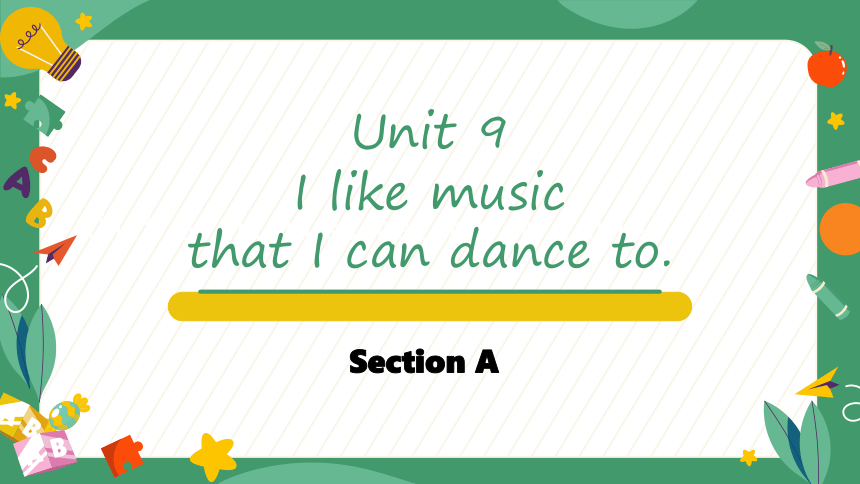 | |
| 格式 | pptx | ||
| 文件大小 | 4.9MB | ||
| 资源类型 | 教案 | ||
| 版本资源 | 人教新目标(Go for it)版 | ||
| 科目 | 英语 | ||
| 更新时间 | 2024-09-03 21:03:43 | ||
图片预览

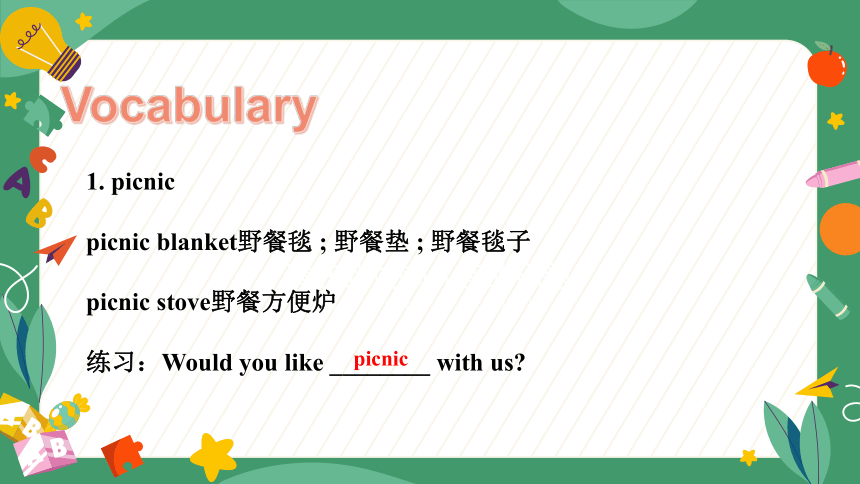

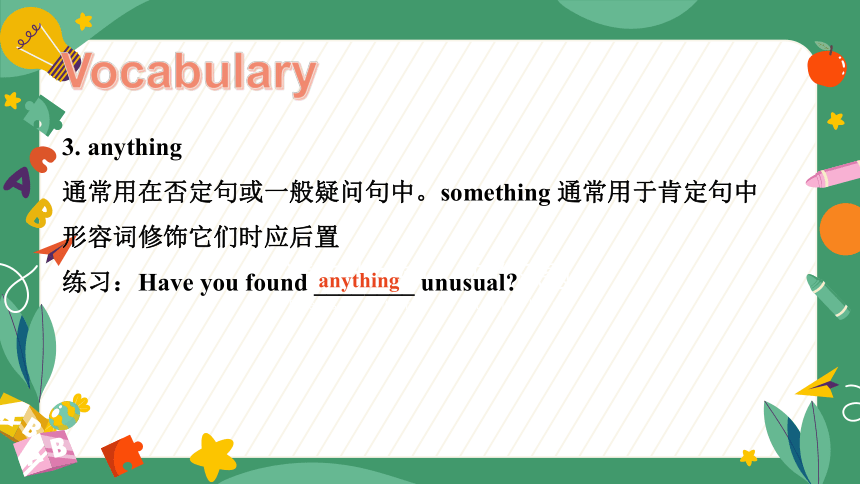

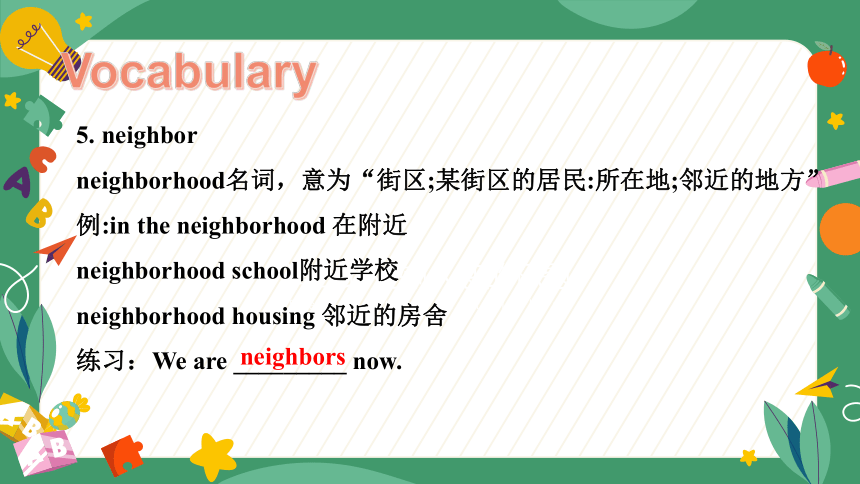
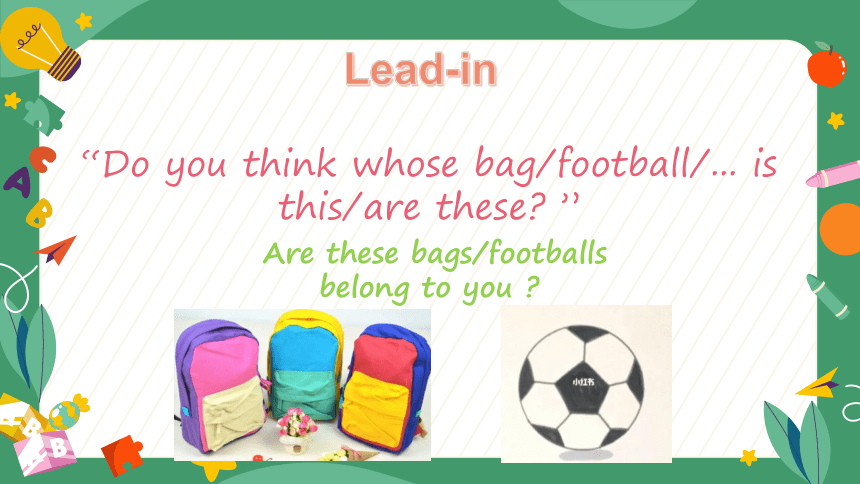


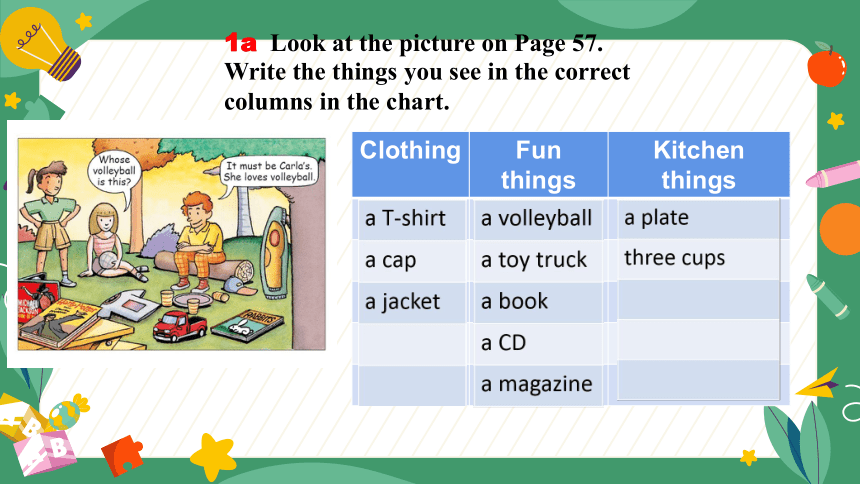
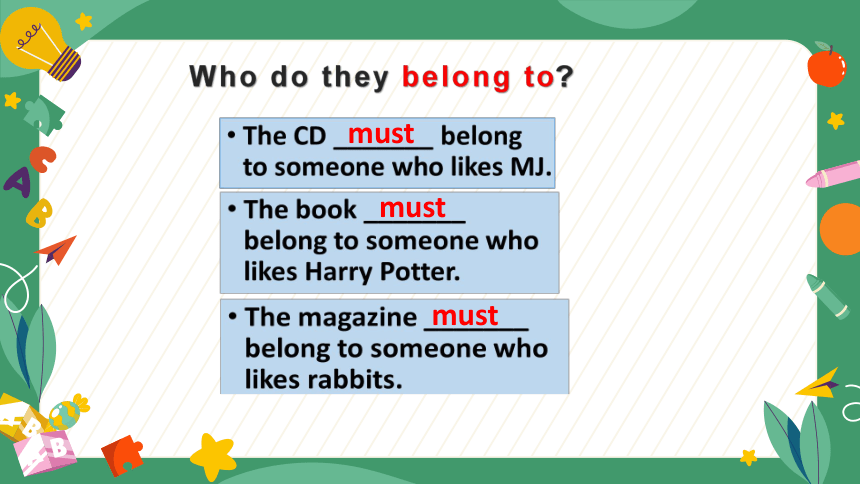
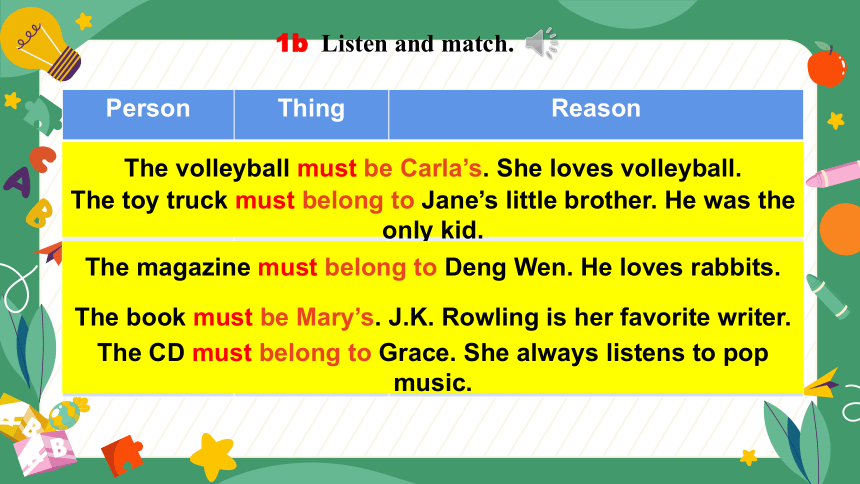
文档简介
(共39张PPT)
Unit 8 It must belong to Carla.
Section A
Unit 9
I like music
that I can dance to.
请在此处输入您的标题
Please enter your title here
Vocabulary
1. picnic
picnic blanket野餐毯 ; 野餐垫 ; 野餐毯子
picnic stove野餐方便炉
练习:Would you like ________ with us
picnic
请在此处输入您的标题
Please enter your title here
Vocabulary
2. belong to
不用于进行时态,也不用于被动语态,后接组织作宾语时表示“是......的一员”。belong to 表示某物“属于”某人,后常跟名词或代词宾格,不能跟名词性物主代词或名词所有格
练习:The islands ________ Spain.
belong to
请在此处输入您的标题
Please enter your title here
Vocabulary
3. anything
通常用在否定句或一般疑问句中。something 通常用于肯定句中形容词修饰它们时应后置
练习:Have you found ________ unusual
anything
请在此处输入您的标题
Please enter your title here
Vocabulary
4. pick up
代词作宾语时须放在 pick 和up 中间,名词作宾语可以放在 pick和up 中间,也可以放在 pick 后面
练习:Look at the paper on the floor. Please _______.
pick it up
请在此处输入您的标题
Please enter your title here
Vocabulary
5. neighbor
neighborhood名词,意为“街区;某街区的居民:所在地;邻近的地方”
例:in the neighborhood 在附近
neighborhood school附近学校
neighborhood housing 邻近的房舍
练习:We are _________ now.
neighbors
Lead-in
Are these bags/footballs belong to you
“Do you think whose bag/football/... is this/are these ”
It ______ be Ms. Wang’s backpack.
She wears a red coat.
must
Whose … is this
It must be …’s. Because …
belong to …
It could / might be …’s. Because …
belong to …
It can’t be …’s. Because …
belong to …
1a Look at the picture on Page 57.
Write the things you see in the correct columns in the chart.
Clothing Fun things Kitchen things
Who do they belong to
must
must
must
1b Listen and match.
Person Thing Reason
volleyball
toy truck
magazine
book
CD
The volleyball must be Carla’s. She loves volleyball.
The toy truck must belong to Jane’s little brother. He was the only kid.
The magazine must belong to Deng Wen. He loves rabbits.
The book must be Mary’s. J.K. Rowling is her favorite writer.
The CD must belong to Grace. She always listens to pop music.
1c Practice the conversation in the picture
above. Then make conversations using
the information in 1b.
A: Whose book is this
B: It must be Mary’s. J.K. Rowling is her favorite writer.
A: Whose toy truck is this
B: It must be Jane’s little brother’s. / It must belong to Jane’s little brother. Because he was the only little kid in the picnic.
2a Listen and answer the questions.
1.What’s in the schoolbag
2. Whose schoolbag is this Why
A school T-shirt, a hair band and tennis balls.
It must be Linda’s schoolbag.
She has long hair and she’s on the tennis team.
Things in the schoolbag
1. __________________________.
2. __________________________.
3. __________________________.
T-shirt
hair band
tennis balls
2b Listen again. Fill in the blanks.
The person ________ go to our school.
The person ________ be a boy.
It ________ be Mei’s hair band.
The hair band _______ belong to Linda.
It ________ be Linda’s schoolbag.
must
can't
could
might
must
2c Make conversations using the
information in 2a and 2b.
A: Look! There's a schoolbag here.
B: What's inside
A: There's a T-shirt, ...
2d Read and answer the questions.
She is really worried.
She will call her friends to check if anybody has it.
3.Why is Linda worried
4.What are there in her schoolbag
5.Does Linda think her schoolbag is lost Why
Because she can’t find her schoolbag.
Her books, her pink hair band and some tennis balls.
No. She thinks her friends must have picked it up.
Language points
1. belong to 属于
The guitar might belong to Alice.
这把吉他也许是爱丽丝的。
China belongs to the third world.
中国属于第三世界。
2. attend a concert
attend v. 出席;参加
Children must attend school.
儿童必须上学。
I promised to attend the show.
我答应去观看文艺演出。
They were sent to the hospital to attend
short-term training courses.
他们被派到医院去参加短训班。
Look at the picture and answer the two questions.
1. What can you see in the picture
2. What can we know about the woman
There is a woman looking out of the window.
She is a little worried.
She might …
3a
Read the article and decide which might be the best title.
A. The Science of Déjà Vu
B. The Mystery of Déjà Vu
C. The Meaning of Déjà Vu
3b
Read the article again and answer the questions.
1. Where does the term Déjà Vu come from and what does it mean
2. What do some people believe about the familiar scenes during a Déjà Vu experience
3. How do most scientists explain déjà vu
4. What should you do ifyou experience déjà vu often
5. Among all the opinions about déjà vu, which one interests you most why
3c
What do you think about déjà vu
Share your experiences or ideas with a partner.
Language points
1. It used to be very quiet. 那里曾今很安静。
used to do sth. 曾经,过去常常做
某事(现在不做了)
be used to do sth. (=be used for doing sth.)
被用来做某事
be used to doing sth. 习惯于做某事
2. However, these days, something unusual is
happening in our town. 然而,这些日子以来,我们镇子发生了一些不寻常的事情。
构成:不定代词+形容词
something important
一些重要的事情
something interesting
一些有趣的事
3. There must be something visiting the homes in our neighborhood, but what is it 一定有什么东西造访了我们社区的家,但那是什么呢?
there must be意为“一定有”,是there be句型和情态动词连用,表示对现在情况的推测。
There must be someone in the room. 房间里一定有人。
【拓展】There must be + 名词 + v.-ing表示“一定有……正在做”。
情态动词 must,can,could, may,might 表推测的用法
情态动词中的 must,can,could,may,might 都可以表推测。其中 must 表示的可能性最大,can/could 次之, may/ might 最小。它们的具体用法如下:
1.must的用法
(1)表示推测“可能性”时,意思是“一定,准是”,语气较肯定,较有把握
例: He must be American. = It is certain that he is American.他准是美国人
(2)must表推测只能用于肯定句中。如果要表示“一定不,肯定不”的意思,应用can't;如果要询问某种可能,应用can。
例: He must know my address.他肯定知道我的地址。(一定)
He can't know my address.他肯定不知道我的地址。(一定不)
Can he know my address 他可能知道我的地址吗 (询问可能性)
(3)must 表示推测时,可以推测现在/正在进行/过去发生的动作
例: He must have a car now.他现在一定有一辆小汽车。(现在)
He must be doing his exercises in the classroom.也一定正在教室里做练习。(正在进行)
He must have finished the work.他一定已完成了工作。(过去发生)
小贴士
must表示推测时很少用于将来的情况。一般不用 He must come tomorrow.,而用It's certain/I'm sure that he will come tomorrow
(4)在反意疑问句中,当陈述部分含有表示推测意义的 must 时,疑问部分的助动词应与must后面的动词在非推测情况下的用法保持一致
例: He must be a worker, isn't he 他准是个工人,不是吗 (现在)
It must have rained last night, didn't it 昨晚一定下雨了,是不是 (过去)
You must have learned English for many years, haven't you
你一定学了好多年英语,是吗 (现在完成)
2 can/could的用法
(1)can 表示推测“可能性”时,往往用于否定句或疑问句中。can't“一定不”
语气很肯定。can 在疑问句中的意思是“会,可能”。
例: He can't be at home.=It is impossible that he is at home.他一定不在家
(2)can/cant后可接进行式/完成式,表示对现在发生的动作或过去发生的动作进行推测。
例: They can't be reading in the library. 他们一定不在图书馆读书
He can't have gone to Shanghai for l saw him a minute ago.
他不可能去了上海,我刚才还看见他了
It's so late. Where can she have gone 这么晚了,她可能去哪儿了呢
(3)在反意疑问句中,当陈述部分含有表示推测意义的can't时,疑问部分的助动
词应与can't后面的动词在非推测情况下的用法保持一致。
例: He can't be a teacher, is he 他一定不是教师,是吗
She can't have finished her homework, has she
她一定没有完成家庭作业,是不是
(4)could可用于表示某事有可能发生或可能是事实。
例: The plane could be delayed by fog.飞机可能会因为雾晚点
(5) could 还可以用于表示客气、委婉、礼貌的请求语气。
例: Excuse me, could you tell me the way to the bus station
打扰了,请问去公共汽车站怎样走
Could you help me 请问你能帮我一下吗
(6)couldn't 表示否定推测,表示某事不可能是真实的,或由于特定事实或环境某事肯定不会发生
例:It couldn't possibly be poison.它不可能是毒药
小贴士
couldn't有时与形容词的比较级连用,强调某人或某物不可能再更多地具有某种属性。
例: You couldn't be more wrong! 你真是大错特错!
I couldn't be happier我简直幸福极了
3. may和might的用法
(1)may,might表示推测“可能性”时,意思是“可能,也许”,语气没有must肯定。
例: He may/might be An American. = It is possible that he is American.他可能是美国人。
小贴士
might不表示过去时态,只是语气上比 may 更委婉,表示的可能性更小
(2)may,might 表推测时,可以用于否定句中,意思是“可能不,也许不”,但不用于疑问句中。
例: He may/might not be at home.他也许不在家
(3)may,might可以推测现在正在发生的动作或过去发生的动作
例: He may/might be sleeping now.他可能正在睡觉。(现在)
The boy may/might not be watching TV at home那个男孩儿可能没在家里看电视。(现在)
These students may/might have seen the film before.这些学生以前可能看过这部电影。(过去)
(4) may,might还可以推测将来的情况
例:I think we should take raincoats with us. It may rain.我想我们应该带上雨衣,可能会下雨
She might not come this afternoon.她今天下午可能不来了。
4a
Choose the best way to complete each sentence using the words in brackets.
1. A: Where’s Jean
B: I’m not sure. She ________ (is/ might be/ must be) in the laboratory.
might be
4b
Complete these responses.
1. A: Many people are wearing coats.
B: The weather must be _____________
____________.
2. A: Sally has been coughing a lot.
B: She might be _____________________.
getting colder/ cold outside
having a sore throat/ ill
must be delicious
be that boring
4c
Look at this picture of a room. How much can you tell about the person who lives here Is it a boy or a girl What are his/her hobbies Discuss your ideas with a partner.
Thank You!
Unit 8 It must belong to Carla.
Section A
Unit 9
I like music
that I can dance to.
请在此处输入您的标题
Please enter your title here
Vocabulary
1. picnic
picnic blanket野餐毯 ; 野餐垫 ; 野餐毯子
picnic stove野餐方便炉
练习:Would you like ________ with us
picnic
请在此处输入您的标题
Please enter your title here
Vocabulary
2. belong to
不用于进行时态,也不用于被动语态,后接组织作宾语时表示“是......的一员”。belong to 表示某物“属于”某人,后常跟名词或代词宾格,不能跟名词性物主代词或名词所有格
练习:The islands ________ Spain.
belong to
请在此处输入您的标题
Please enter your title here
Vocabulary
3. anything
通常用在否定句或一般疑问句中。something 通常用于肯定句中形容词修饰它们时应后置
练习:Have you found ________ unusual
anything
请在此处输入您的标题
Please enter your title here
Vocabulary
4. pick up
代词作宾语时须放在 pick 和up 中间,名词作宾语可以放在 pick和up 中间,也可以放在 pick 后面
练习:Look at the paper on the floor. Please _______.
pick it up
请在此处输入您的标题
Please enter your title here
Vocabulary
5. neighbor
neighborhood名词,意为“街区;某街区的居民:所在地;邻近的地方”
例:in the neighborhood 在附近
neighborhood school附近学校
neighborhood housing 邻近的房舍
练习:We are _________ now.
neighbors
Lead-in
Are these bags/footballs belong to you
“Do you think whose bag/football/... is this/are these ”
It ______ be Ms. Wang’s backpack.
She wears a red coat.
must
Whose … is this
It must be …’s. Because …
belong to …
It could / might be …’s. Because …
belong to …
It can’t be …’s. Because …
belong to …
1a Look at the picture on Page 57.
Write the things you see in the correct columns in the chart.
Clothing Fun things Kitchen things
Who do they belong to
must
must
must
1b Listen and match.
Person Thing Reason
volleyball
toy truck
magazine
book
CD
The volleyball must be Carla’s. She loves volleyball.
The toy truck must belong to Jane’s little brother. He was the only kid.
The magazine must belong to Deng Wen. He loves rabbits.
The book must be Mary’s. J.K. Rowling is her favorite writer.
The CD must belong to Grace. She always listens to pop music.
1c Practice the conversation in the picture
above. Then make conversations using
the information in 1b.
A: Whose book is this
B: It must be Mary’s. J.K. Rowling is her favorite writer.
A: Whose toy truck is this
B: It must be Jane’s little brother’s. / It must belong to Jane’s little brother. Because he was the only little kid in the picnic.
2a Listen and answer the questions.
1.What’s in the schoolbag
2. Whose schoolbag is this Why
A school T-shirt, a hair band and tennis balls.
It must be Linda’s schoolbag.
She has long hair and she’s on the tennis team.
Things in the schoolbag
1. __________________________.
2. __________________________.
3. __________________________.
T-shirt
hair band
tennis balls
2b Listen again. Fill in the blanks.
The person ________ go to our school.
The person ________ be a boy.
It ________ be Mei’s hair band.
The hair band _______ belong to Linda.
It ________ be Linda’s schoolbag.
must
can't
could
might
must
2c Make conversations using the
information in 2a and 2b.
A: Look! There's a schoolbag here.
B: What's inside
A: There's a T-shirt, ...
2d Read and answer the questions.
She is really worried.
She will call her friends to check if anybody has it.
3.Why is Linda worried
4.What are there in her schoolbag
5.Does Linda think her schoolbag is lost Why
Because she can’t find her schoolbag.
Her books, her pink hair band and some tennis balls.
No. She thinks her friends must have picked it up.
Language points
1. belong to 属于
The guitar might belong to Alice.
这把吉他也许是爱丽丝的。
China belongs to the third world.
中国属于第三世界。
2. attend a concert
attend v. 出席;参加
Children must attend school.
儿童必须上学。
I promised to attend the show.
我答应去观看文艺演出。
They were sent to the hospital to attend
short-term training courses.
他们被派到医院去参加短训班。
Look at the picture and answer the two questions.
1. What can you see in the picture
2. What can we know about the woman
There is a woman looking out of the window.
She is a little worried.
She might …
3a
Read the article and decide which might be the best title.
A. The Science of Déjà Vu
B. The Mystery of Déjà Vu
C. The Meaning of Déjà Vu
3b
Read the article again and answer the questions.
1. Where does the term Déjà Vu come from and what does it mean
2. What do some people believe about the familiar scenes during a Déjà Vu experience
3. How do most scientists explain déjà vu
4. What should you do ifyou experience déjà vu often
5. Among all the opinions about déjà vu, which one interests you most why
3c
What do you think about déjà vu
Share your experiences or ideas with a partner.
Language points
1. It used to be very quiet. 那里曾今很安静。
used to do sth. 曾经,过去常常做
某事(现在不做了)
be used to do sth. (=be used for doing sth.)
被用来做某事
be used to doing sth. 习惯于做某事
2. However, these days, something unusual is
happening in our town. 然而,这些日子以来,我们镇子发生了一些不寻常的事情。
构成:不定代词+形容词
something important
一些重要的事情
something interesting
一些有趣的事
3. There must be something visiting the homes in our neighborhood, but what is it 一定有什么东西造访了我们社区的家,但那是什么呢?
there must be意为“一定有”,是there be句型和情态动词连用,表示对现在情况的推测。
There must be someone in the room. 房间里一定有人。
【拓展】There must be + 名词 + v.-ing表示“一定有……正在做”。
情态动词 must,can,could, may,might 表推测的用法
情态动词中的 must,can,could,may,might 都可以表推测。其中 must 表示的可能性最大,can/could 次之, may/ might 最小。它们的具体用法如下:
1.must的用法
(1)表示推测“可能性”时,意思是“一定,准是”,语气较肯定,较有把握
例: He must be American. = It is certain that he is American.他准是美国人
(2)must表推测只能用于肯定句中。如果要表示“一定不,肯定不”的意思,应用can't;如果要询问某种可能,应用can。
例: He must know my address.他肯定知道我的地址。(一定)
He can't know my address.他肯定不知道我的地址。(一定不)
Can he know my address 他可能知道我的地址吗 (询问可能性)
(3)must 表示推测时,可以推测现在/正在进行/过去发生的动作
例: He must have a car now.他现在一定有一辆小汽车。(现在)
He must be doing his exercises in the classroom.也一定正在教室里做练习。(正在进行)
He must have finished the work.他一定已完成了工作。(过去发生)
小贴士
must表示推测时很少用于将来的情况。一般不用 He must come tomorrow.,而用It's certain/I'm sure that he will come tomorrow
(4)在反意疑问句中,当陈述部分含有表示推测意义的 must 时,疑问部分的助动词应与must后面的动词在非推测情况下的用法保持一致
例: He must be a worker, isn't he 他准是个工人,不是吗 (现在)
It must have rained last night, didn't it 昨晚一定下雨了,是不是 (过去)
You must have learned English for many years, haven't you
你一定学了好多年英语,是吗 (现在完成)
2 can/could的用法
(1)can 表示推测“可能性”时,往往用于否定句或疑问句中。can't“一定不”
语气很肯定。can 在疑问句中的意思是“会,可能”。
例: He can't be at home.=It is impossible that he is at home.他一定不在家
(2)can/cant后可接进行式/完成式,表示对现在发生的动作或过去发生的动作进行推测。
例: They can't be reading in the library. 他们一定不在图书馆读书
He can't have gone to Shanghai for l saw him a minute ago.
他不可能去了上海,我刚才还看见他了
It's so late. Where can she have gone 这么晚了,她可能去哪儿了呢
(3)在反意疑问句中,当陈述部分含有表示推测意义的can't时,疑问部分的助动
词应与can't后面的动词在非推测情况下的用法保持一致。
例: He can't be a teacher, is he 他一定不是教师,是吗
She can't have finished her homework, has she
她一定没有完成家庭作业,是不是
(4)could可用于表示某事有可能发生或可能是事实。
例: The plane could be delayed by fog.飞机可能会因为雾晚点
(5) could 还可以用于表示客气、委婉、礼貌的请求语气。
例: Excuse me, could you tell me the way to the bus station
打扰了,请问去公共汽车站怎样走
Could you help me 请问你能帮我一下吗
(6)couldn't 表示否定推测,表示某事不可能是真实的,或由于特定事实或环境某事肯定不会发生
例:It couldn't possibly be poison.它不可能是毒药
小贴士
couldn't有时与形容词的比较级连用,强调某人或某物不可能再更多地具有某种属性。
例: You couldn't be more wrong! 你真是大错特错!
I couldn't be happier我简直幸福极了
3. may和might的用法
(1)may,might表示推测“可能性”时,意思是“可能,也许”,语气没有must肯定。
例: He may/might be An American. = It is possible that he is American.他可能是美国人。
小贴士
might不表示过去时态,只是语气上比 may 更委婉,表示的可能性更小
(2)may,might 表推测时,可以用于否定句中,意思是“可能不,也许不”,但不用于疑问句中。
例: He may/might not be at home.他也许不在家
(3)may,might可以推测现在正在发生的动作或过去发生的动作
例: He may/might be sleeping now.他可能正在睡觉。(现在)
The boy may/might not be watching TV at home那个男孩儿可能没在家里看电视。(现在)
These students may/might have seen the film before.这些学生以前可能看过这部电影。(过去)
(4) may,might还可以推测将来的情况
例:I think we should take raincoats with us. It may rain.我想我们应该带上雨衣,可能会下雨
She might not come this afternoon.她今天下午可能不来了。
4a
Choose the best way to complete each sentence using the words in brackets.
1. A: Where’s Jean
B: I’m not sure. She ________ (is/ might be/ must be) in the laboratory.
might be
4b
Complete these responses.
1. A: Many people are wearing coats.
B: The weather must be _____________
____________.
2. A: Sally has been coughing a lot.
B: She might be _____________________.
getting colder/ cold outside
having a sore throat/ ill
must be delicious
be that boring
4c
Look at this picture of a room. How much can you tell about the person who lives here Is it a boy or a girl What are his/her hobbies Discuss your ideas with a partner.
Thank You!
同课章节目录
- Unit 1 How can we become good learners.
- Section A
- Section B
- Unit 2 I think that mooncakes are delicious!
- Section A
- Section B
- Unit 3 Could you please tell me where the restroom
- Section A
- Section B
- Unit 4 I used to be afraid of the dark.
- Section A
- Section B
- Unit 5 What are the shirts made of?
- Section A
- Section B
- Review of Units 1-5
- Unit 6 When was it invented?
- Section A
- Section B
- Unit 7 Teenagers should be allowed to choose their
- Section A
- Section B
- Unit 8 It must belong to Carla.
- Section A
- Section B
- Unit 9 I like music that I can dance to.
- Section A
- Section B
- Unit 10 You're supposed to shake hands.
- Section A
- Section B
- Review of Units 6-10
- Unit 11 Sad movies make me cry.
- Section A
- Section B
- Unit 12 Life is full of the unexpected
- Section A
- Section B
- Unit 13 We're trying to save the earth!
- Section A
- Section B
- Unit 14 I remember meeting all of you in Grade 7.
- Section A
- Section B
- Review of Units 11-14
